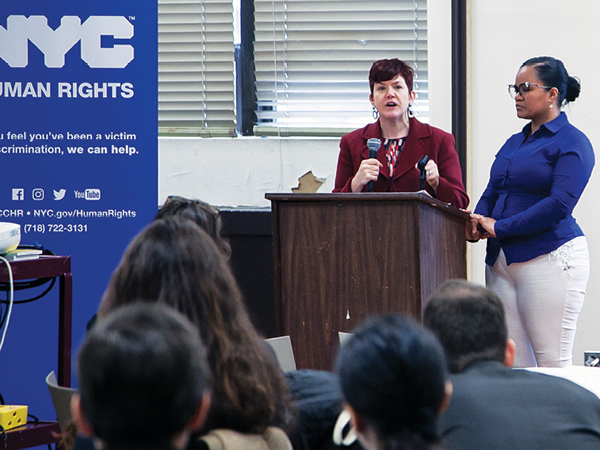Public Employee Press
DC 37 News
Breaking the glass ceiling
A conference sponsored by Local 154 and the NYC Human Rights Commission explores opportunities for women in labor trades.
By DIANE S. WILLIAMS

“Most events honoring women’s history focus on past achievements. We decided to present a chance for women to move forward and acquire skills and apprenticeships for jobs traditionally held by men, and to share practical advice on sexual harassment,” said Marissa Jackson, a deputy commissioner at the New York City Commission on Human Rights, which cosponsored the event with Amalgamated Professional Employees Local 154.
Local 154 President Juan Fernandez, welcomed HRC representatives, along with Public Advocate Letitia James and attorney Anne Clark, a board member of Nontraditional Employment for Women.
NEW is a training and advocacy program that prepares women for skilled trades jobs. The union hall event also offered two afternoon workshops on working with transgender persons and New York City human rights law.
“The Human Rights Commission enforces your rights. You don’t need a lawyer to file a charge,” said Human Rights Commission Chair Carmelyn Malalis. “Women are entitled to a bathroom, equipment that fits, dignity and inclusion. We deserve to be on the job.”
Nationwide, only 3 percent of women work in nontraditional jobs as carpenters, electricians and line construction workers, pipefitters and plumbers, ironworkers and construction laborers. In New York City around 11 percent of trades’ workers are women.
Apprenticeships and training offered at www.new-nyc.org are open to females 18 and older who are able and interested in physically-demanding blue collar jobs. They can improve their lives with a trades job that eventually can pay $45 an hour or more.
“Women in male-dominated workplaces must adopt strategies to cope with issues of harassment and hostility in the workplace,” said Clark. “We face those who think we don’t belong, or can’t do the work, and may be passed over for opportunities to gain advanced skills.
“The fight for gender equality is not just in Hollywood or Silicon Valley,” Clark added. “Gender equality means employers must hire more women.”


